Woman Considers Ending Relationship With Boyfriend If He Doesn't Rehome His Untrained Dog
Long-distance relationships are increasingly popular these days because of the advent of technology.
Not only can you meet a person on a different continent and start a relationship with them, but you can also keep up with them daily through video and audio calls. It cannot get any easier than that!
A 2018 survey even revealed that 60% of long-distance relationships last. That’s a pretty good statistic if you ask us.
However, there are some things you may not know about your partner when they are not in the same space as you.
One Redditor found this out the hard way, and she shared her current situation via her friend’s throwaway account on the AITA subreddit.
OP wrote that she and her boyfriend of two years were considering moving in together after recently living in the same city, as they had been in a long-distance relationship previously.
However, OP’s boyfriend’s dog was proving to be a problem for her and a reason to reconsider the entire relationship. She shared that the dog was untrained and usually made a mess everywhere.
She explained that the dog went as far as pooping on the bed while she and her boyfriend were in it. At this point, she decided to put her foot down and have a serious conversation with her boyfriend.
OP gave her boyfriend an ultimatum to either housetrain or rehome his dog. Failure to do this would make her reconsider their relationship.
Check out the full story below:
OP's boyfriend has to choose between her or the dog

Apparently, OP's boyfriend's dog poops, pees, and pukes all over the house. It's either her boyfriend puts his dog under control, or their relationship could be over soon.
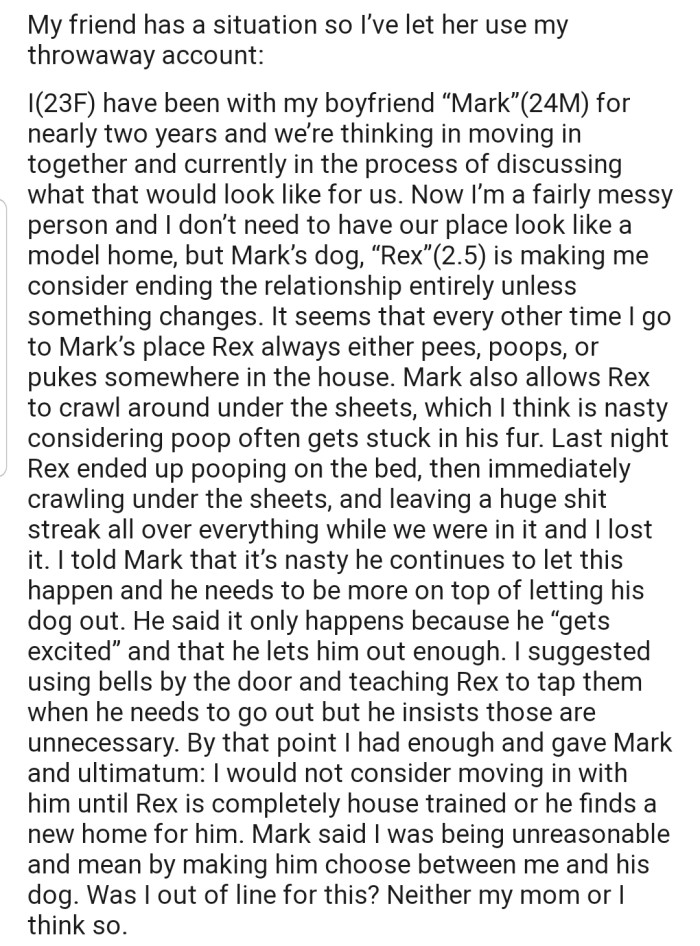
A little more info on the dog
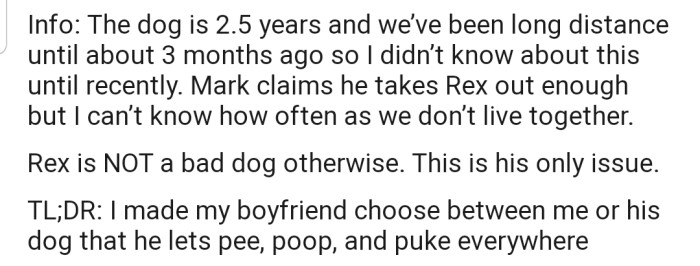
Understanding the Impact of Untrained Pets
Dr. Ian Dunbar, a veterinarian and animal behaviorist, emphasizes that untrained pets can create significant stress within relationships. The behavior of an untrained dog can lead to frustration, especially when the owners do not share the same values regarding pet care.
Research shows that pets often reflect the emotional dynamics of their owners, and untrained animals can exacerbate existing tensions in a relationship.
The Role of Pets in Relationship Dynamics
Pets often play a significant role in family dynamics and can even influence relationship satisfaction. Research shows that shared responsibilities regarding pet care can either strengthen or challenge relationships, depending on how these responsibilities are managed. A study published in the Journal of Family Psychology indicates that couples who communicate effectively about pet care tend to report greater relationship satisfaction.
However, when one partner feels overwhelmed or unappreciated in their caregiving role, it can lead to tension and conflict.
Here's how the Reddit community reacted to the story:
Seems Mark doesn't care about basic hygiene

"This is a boyfriend problem; the dog is untrained and neglected; it's not its fault."
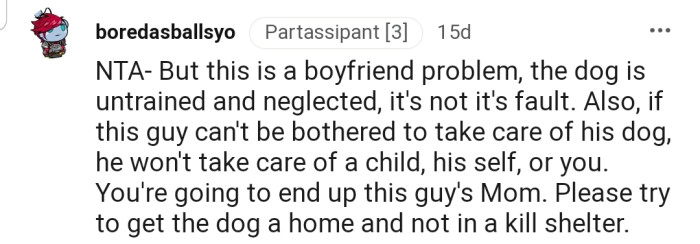
"Like, literally, he's saying for you to move in, you have to be willing to deal with SHIT."

Moreover, Dr. John Paul Scott's research on animal behavior suggests that the dynamics of pet ownership can significantly influence human relationships. When one partner feels overwhelmed by a pet's behavior, it can lead to feelings of resentment and frustration.
This emotional strain can affect overall relationship satisfaction.
Moreover, emotional attachment to pets can complicate decision-making processes within relationships. A psychologist specializing in family dynamics notes that individuals may feel a strong emotional bond with their pets, which can lead to resistance against rehoming a pet, even if it creates stress within the household. According to research from the American Psychological Association, understanding the emotional stakes involved in such decisions is crucial for navigating these conflicts.
Partners need to approach these discussions with empathy and understanding to reach a mutually agreeable solution.
A neglectful dog parent

"NTA, but it isn’t the dog's fault; it’s your partner's."

"You need to rehome your boyfriend. NTA."

The Role of Communication in Pet Ownership
Effective communication is crucial when addressing issues related to pets within relationships. Dr. Marshall Rosenberg’s Nonviolent Communication framework can provide a structure for discussing concerns without escalating conflict.
By expressing needs and feelings openly, couples can work together to address the challenges posed by an untrained pet.
Effective Communication Strategies for Couples
To address the challenges surrounding pet ownership and relationship dynamics, couples can benefit from implementing effective communication strategies. Research suggests that using 'I' statements can help partners express their feelings and concerns without placing blame. For example, rather than saying, 'You need to get rid of the dog,' a partner might say, 'I feel stressed with the current situation and would like to discuss how we can manage the dog's care together.' This approach promotes a more constructive dialogue.
Additionally, setting aside time for regular discussions about pet care responsibilities can help ensure that both partners feel heard and valued in their roles.
"Bad dog owning. Bad boyfriending."

"Mark is gross, and dogs are love; he's not giving that doggo the love he needs."

"NTA. They need training. Someone did a very bad job raising them for them to be THAT disgusting."
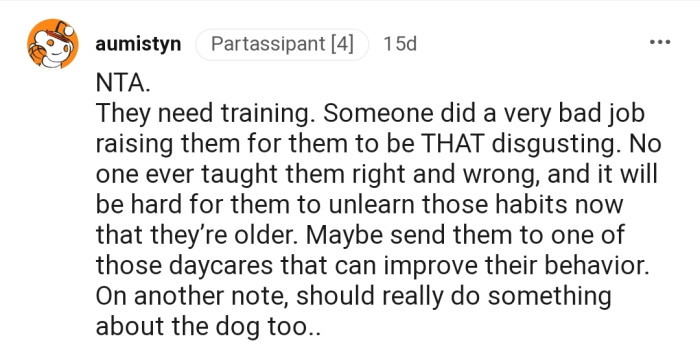
Additionally, understanding the emotional dynamics at play can help couples navigate these issues. Dr. Sue Johnson, a pioneer in couples therapy, emphasizes that "open communication about pet behavior can significantly enhance relationship satisfaction." Her research indicates that couples who engage in regular discussions about their pet’s behavior report higher relationship satisfaction. You can find more insights on her work at iceeft.com. Open communication can allow partners to align their expectations and responsibilities regarding pet care.
Moreover, couples might consider exploring compromises that respect each partner's emotional connection to the pet. Research indicates that collaborative problem-solving can lead to more satisfactory outcomes in relationship conflicts. Engaging in open discussions about potential solutions—such as shared pet care responsibilities—can help partners feel more united in their caregiving roles.
Ultimately, fostering a sense of teamwork in pet ownership can enhance the emotional bond between partners.
"The dog either needs training or rehousing, as this isn't fair to anyone involved, including the dog."
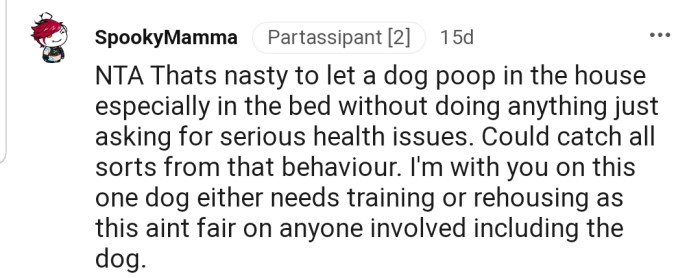
Dogs are the cutest, but they can also be the messiest. This is why training them is pretty important.
OP’s boyfriend did not receive any support for his failure to train his dog or consider OP’s complaints. Some commenters believe that if he is this unbothered about the dog’s mess, he may be messy about other aspects of his life.
What do you think? Is OP being too demanding, or do you think her boyfriend needs to do better? Let us know your thoughts in the comments below!
Psychological Analysis
This situation highlights the emotional complexities that can arise from pet ownership in relationships. It's essential for partners to communicate openly about their feelings and work together to find solutions that respect each other's emotional connections to their pets.
Analysis generated by AI
Analysis & Alternative Approaches
In conclusion, the dynamics of pet ownership can significantly influence relationship satisfaction and emotional well-being. By communicating effectively and collaboratively addressing pet care responsibilities, couples can foster a more harmonious living environment. Recognizing each partner's emotional attachment to pets is essential for navigating these discussions and maintaining a strong relationship.
Practical Steps for Couples with Pets
To manage the challenges of untrained pets, couples should consider establishing a training plan together. Dr. Ian Dunbar recommends that both partners participate in training sessions to foster a sense of teamwork.
By collaborating on training, couples can strengthen their bond while addressing behavioral concerns, ultimately leading to a more harmonious household.
Analysis & Alternative Approaches
Addressing the challenges of untrained pets requires understanding and effective communication between partners. Clinical psychologists emphasize that fostering a collaborative approach is essential for maintaining relationship satisfaction.
As research indicates, 'Healthy communication and shared responsibility can transform challenges into opportunities for connection and growth.' This principle is vital for nurturing relationships with pets.



